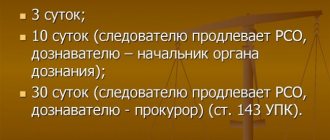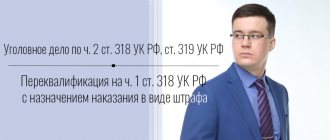Article 20 of the Code of Criminal Procedure of the Russian Federation considers such a legal concept as “types of criminal prosecution”.
If a criminal case is initiated, then criminal prosecution is conducted against the suspect (later the accused). Because of its role, stalking is one of the core concepts of criminology. The investigator or inquiry officer clarifies the circumstances of the criminal act, formulates charges for subsequent submission of materials to the court. Multi-channel free hotline Legal advice on criminal law. Every day from 9.00 to 21.00
Moscow and region: +7 (495) 662-44-36
St. Petersburg: +7 (812) 449-43-40
What are the types of criminal prosecution?
Persecution under criminal law is characterized by the following points:
- The direction of activity is strictly defined by criminal procedure legislation.
- The powers of investigation and sentencing are vested in law enforcement officials.
- Persecution is of a state nature and is ensured by special state instruments.
- Criminal prosecution is the basis of criminal proceedings.
The task of investigating a wrongful act is solved in the process of collecting evidence and drawing up an indictment document (conclusion or act). At the trial stage, the prosecutor defends the prosecution's position before the court.
The main factor in determining the type of criminal prosecution is the severity and nature of the criminal episode.
The law provides for three types of procedural order:
- public;
- private;
- private-public.
In each of its manifestations, prosecution has its own characteristics, determined by a set of procedural means and methods of detecting and proving circumstances relevant to the case. All categories are characterized by certain rules for the preparation of case materials, grounds for termination of proceedings in the case and, accordingly, a method for terminating prosecution.
Previously, the scientific concept and all types of criminal prosecution were identified with the term “accusation”. In modern criminal law, prosecution is a form of prosecution. It also applies to situations where charges have just been brought against a person. Changes in the manifestations of persecution occur depending on the stage of criminal proceedings, while the accusation remains unchanged both at the stage of preliminary investigation and during judicial proceedings.
Time limits during which criminal prosecution may be carried out
Article 78 of the Criminal Code of the Russian Federation establishes the maximum terms of criminal prosecution:
- for a minor crime – 2 years;
- average – 6 years;
- serious – 10 years;
- especially serious – 15 years.
These periods are called statutes of limitations; after their expiration, the offender is released from liability. The period is calculated from the moment the crime is committed until the moment when the sentence passed by the court comes into force.
If the offender is fleeing justice, the statute of limitations will be suspended. Its course will resume after arrest or self-report to law enforcement agencies. The court decides whether to use statutes of limitations when determining liability for crimes for which the death penalty or life imprisonment may be imposed.
Note!
The death penalty, as a punishment for a crime, is retained in the Criminal Code of the Russian Federation. This is not currently enforced, but this may change at any time.
For articles related to terrorism and crimes against the conduct of war, statutes of limitations do not apply.
What are private prosecution cases?
The private prosecution procedure is applied to only three types of criminal acts that do not pose a wide public danger:
- Part 1 of Article 115 of the Criminal Code of the Russian Federation (minor harm to health).
- Article 116.1 of the Criminal Code of the Russian Federation (battery by a citizen who was previously held accountable for a similar offense under the Code of Administrative Offenses of the Russian Federation during the year).
- Part 1 of Article 128.1 of the Criminal Code of the Russian Federation (dissemination of knowingly false information, that is, slander).
Private criminal prosecution is carried out by the victim, that is, a person who has suffered property, physical or moral harm. Battery is not directly related to property damage, and slander is not directly related to physical damage. However, minor health damage may be accompanied, for example, by torn clothing. As a result of slander, a person’s health may suddenly deteriorate (heart attack or stroke).
A private prosecutor must know the person he is accusing. If the offender is unknown to the victim, the latter should file a complaint with the police.
In cases where the victim is in a helpless (dependent) state (pregnancy, young age), the prosecutor or an employee of the guardianship and trusteeship department of the local municipality can act as an accuser. A classic example is the infliction of physical harm on a minor by his parent. The legal representative of the child’s interests himself violates his rights. In this situation, government bodies are allowed to use the powers of protection.
The Criminal Procedure Code of the Russian Federation stipulates that proceedings based on private prosecution materials can be terminated after reconciliation of the parties. Reconciliation can be achieved before the judge retires to the deliberation room. The permissible limit for the period of reconciliation in the appellate instance is also removal for the decision. The court must notify the victim and the harm-cauter about the admissibility of reconciliation.
If the parties decide to reconcile, the judge does not have the right to refuse them this decision. An exception may be cases when one - a minor victim - does not agree with the opinion of his representative under the law on reconciliation.
Situations often arise when acts containing signs of crimes are intertwined in the same event, the prosecution of which is carried out privately and publicly.
During a quarrel in the yard, A. broke the outside rear-view mirror of a Nissan car, causing B. significant damage in the amount of 7,350 rubles. This act is provided for in Part 1 of Article 167 of the Criminal Code of the Russian Federation (intentional damage to someone else’s property). In response, B. hit A. on the knee with his booted foot. A. recorded the beatings in accordance with Part 1 of Article 116 of the Criminal Code of the Russian Federation.
The investigator found out the circumstances of the crime of damaging someone else's property, and A.'s statement about beating him was sent to the magistrate of the court district for trial on a private charge.
How is the duty to prosecute carried out?
The obligation to carry out criminal prosecution is discussed in Art. 21 Code of Criminal Procedure of the Russian Federation. According to the requirements of this article, prosecution must be carried out in the following order:
- There are three procedures for bringing charges: public, private and private-public.
- The private and private-public nature of the accusation requires the presence of a statement from the victim or his legal representative. This procedure is provided for the investigation of crimes of minor gravity. However, if the criminal is unknown or the victim is in a helpless state, the prosecutor's office and investigative authorities are obliged to open a case on such facts, even in the absence of a statement.
- The prosecutor has the right, after initiating a case under the Criminal Code of the Russian Federation, to conclude a pre-trial agreement with the parties to the process.
- Criminal prosecution should be carried out by the prosecutor's office, investigative and inquiry bodies.
- According to the requirements of these bodies, all citizens and organizations are required to take part in the administration of justice.
How is a private prosecution case initiated?
Consideration of private criminal cases falls within the powers of the magistrate. The victim or his legal representative personally applies to the court with a statement accusing a specific person of committing a criminal act and applying corrective measures to him. The composition of the unlawful act is determined by the victim himself.
The application is drawn up according to a specific plan and contains information:
- Name and address of the court site.
- Brief description of the criminal event (place, time, circumstances).
- Please open a case.
- Information about the victim (last name, first name, patronymic in full, passport details).
- Known details of the accused person (full name required).
- List of witnesses (full name, addresses, contact numbers).
- Date, signature.
The application is accompanied by its copies, the number of which corresponds to the number of persons held accountable.
When considering a private prosecution case, the prosecutor defends the rights of the victim. The entry of a public prosecutor into the case does not deprive the parties of the opportunity to reconcile. The prosecutor, if necessary, draws the attention of the magistrate and the victim to the facts when reconciliation is concluded under pressure from the defense.
If the victim does not agree to reconcile, a court hearing is scheduled to consider the case. The magistrate, within a period not exceeding 7 days from the date of registration of the application, calls the citizen in respect of whom the application was filed to familiarize himself with the materials. The accused is given a copy of the statement, his rights are explained, and he is asked to invite defense witnesses to the court.
The fact that the accusation is brought forward and supported not by law enforcement officials, but by the victim himself, does not mean that this activity is not ensured by government measures. The state guarantees unimpeded access for the victim to the consideration of the criminal case.
Consideration of private prosecution materials is similar to the resolution of a dispute between the plaintiff and defendant in a civil trial. However, in criminal law, the actual punishment is given to the culprit.
If aggravating features are discovered in the commission of an unlawful act, the case will become public. For example, if the harm to the victim’s health was caused by racial hostility (Nazism), then a new charge will be supported by a member of the prosecutor’s office.
The procedure established by part 2 of Art. 20 of the Code of Criminal Procedure of the Russian Federation is used quite rarely in modern legal practice.





